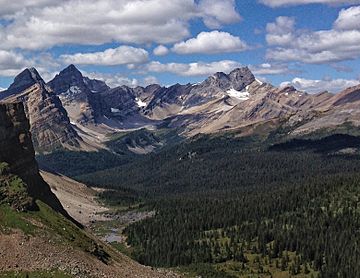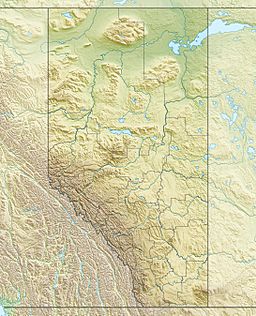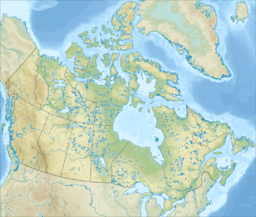Watermelon Peak facts for kids
Quick facts for kids Watermelon Peak |
|
|---|---|

Watermelon Peak seen from Molar Pass with summit to right of center and outlier S2 to left
|
|
| Highest point | |
| Elevation | 3,094 m (10,151 ft) |
| Prominence | 674 m (2,211 ft) |
| Parent peak | Deluc Peak (3182 m) |
| Listing | Mountains of Alberta |
| Geography | |
| Location | Banff National Park Alberta, Canada |
| Parent range | Canadian Rockies |
| Topo map | NTS 82N09 |
| Geology | |
| Age of rock | Cambrian |
| Climbing | |
| First ascent | 1966 D. Michael, W.V.G. Matthews, W.L. Putnam, M. Stearns, L.R. Wallace |
| Easiest route | Scrambling YDS 3 |
Watermelon Peak is a 3,094-metre (10,151-foot) summit located in Banff National Park, in the Canadian Rockies of Alberta, Canada. Its nearest higher peak is Deluc Peak, 13.5 km (8.4 mi) to the east.
History
Watermelon Peak was named in 1966 by William L. Putnam, member of the first ascent party which carried a four kilogram watermelon to the summit, and consumed it there. The July 1966 first ascent party included David Michael, W.V.G. Matthews, William L. Putnam, M. Stearns, and L.R. Wallace.
Geology
Like other mountains in Banff Park, Watermelon Peak is composed of sedimentary rock laid down during the Precambrian to Jurassic periods. Formed in shallow seas, this sedimentary rock was pushed east and over the top of younger rock during the Laramide orogeny.
Climate
Based on the Köppen climate classification, Watermelon Peak is located in a subarctic climate zone with cold, snowy winters, and mild summers. Temperatures can drop below −20 °C with wind chill factors below −30 °C. Precipitation runoff from Watermelon Peak drains into the Bow River and Siffleur River which are both tributaries of the Saskatchewan River.
 | Ernest Everett Just |
 | Mary Jackson |
 | Emmett Chappelle |
 | Marie Maynard Daly |



